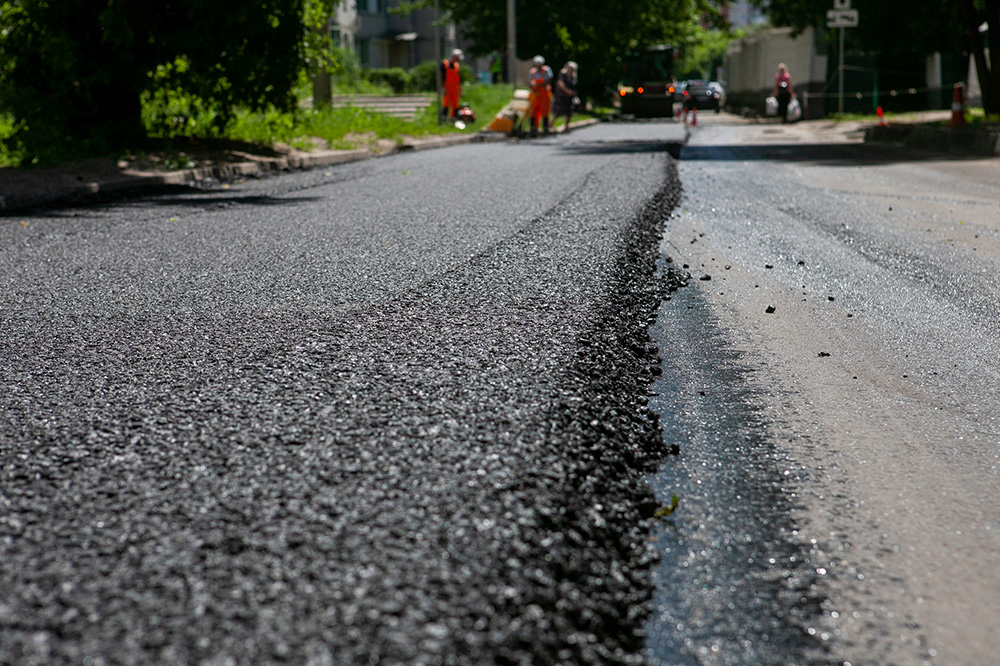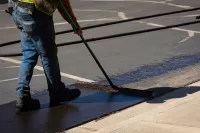Unearthing 5 fascinating facts about asphalt
Need a quirky ice breaker? Ask your friends to tell you the weirdest things they know about asphalt. Hey, when you’re passionate about what you do (like we are at Bulldog Paving), this is how we like to spend our time off.
I recently tried this with my buddies and you wouldn’t believe some of the stuff that came up. We ended up debating whether it would be better to bury a dead body in asphalt or cement (yes – I have morbid friends). Too bad our online searches turned up dead ends. (Get it?)
Since we couldn’t settle that one, the discussion shifted to a bunch of other cool asphalt facts. Here are just a few of our favourites!
1. There are entire lakes made of bitumen.
It’s true! There are several places in the world where bitumen, the binding ingredient that holds asphalt together, seeps up from the earth to form a lake of sorts.
These bitumen lakes are sometimes called tar pits and they’re a fascinating geological feature. They’re formed when underground oil deposits escape through fractures or faults in the Earth’s crust. Over time, the lighter components of the petroleum evaporate, leaving behind a thick, sticky residue that forms pools or lakes.
Among the most famous is the La Brea Tar Pits in Los Angeles, California and even though it’s still an active research site, it’s also a popular tourist attraction. There are several others though, like Carpinteria Tar Pits (also in California), Guanoco Lake in Venezuela, and Pitch Lake in Trinidad and Tobago. They’re a treasure trove for palaeontologists, since the asphalt trapped and preserved all kinds of prehistoric animal remains. In Azerbaijan, on the Caspian Sea, cave lions dating back to the Pleistocene era have been found in Binagadi Asphalt Lake. It’s thought to be 96-120 thousand years old!
Practically speaking, these natural formations are also good for providing asphalt for various purposes like road construction and waterproofing. They even harbour unique ecosystems where microorganisms and bacteria have adapted to thrive in extreme environments. Seriously intriguing stuff!
2. Asphalt was used for mummification.
Hello, burial rituals! Okay, so we couldn’t confirm a clear winner on the cement versus asphalt debate, but we definitely know that asphalt played a role in Ancient Egyptian burials. Dark residue has been found on mummies, and the theory is that bitumen was used as an embalming material.
Bitumen also showed up in various other stages of mummification to preserve the bodies of the deceased. It was applied to the skin and used to seal the body cavities, providing a protective barrier against decomposition. And it helped to immobilize and secure the body’s organs, so they stayed in the right place within the mummy. Gross.
3. Asphalt is eco-friendly.
Pave paradise, put up a parking lot? It’s not so bad, really, if you’re using asphalt. We bet you didn’t know that millions of tons of asphalt are reclaimed every year for reuse and recycling! In fact, according to the National Asphalt Pavement Association, 97 million tons was reclaimed in 2019, and nearly 100% of this reclaimed asphalt pavement (RAP) was recycled. Asphalt is one of the most recycled materials on the planet.
Recycling RAP keeps it out of landfills, and better yet, since plastic can be used as a binding agent, asphalt usage helps to deflect extra plastic from landfills, too! Recycling processes also conserve energy and reduce greenhouse gas emissions associated with the production of new asphalt.
Plus, properly designed and maintained asphalt pavements have a longer lifespan than other comparable materials, reducing the need for frequent repairs or replacements. With ongoing research and innovation, the asphalt industry is continuing to strive for more sustainable practices, making it an environmentally friendly choice for all kinds of infrastructure projects.
4. It’s got a paving history dating back to 625 BC.
Ancient Egypt had its mummies; Babylon had its roads. As early as 625 BC, asphalt was used to construct roads, with the first recorded Babylonian road during the reign of King Nabopolassar.
Ancient Greeks also used asphalt in various construction applications, and the name itself derives from the Greek word ‘asphaltos’, meaning ‘secure’. And not to be outdone, ancient Romans used asphalt to seal water supplies like baths, reservoirs, and aqueducts.
Today, there are 2.6 million miles of paved roads in the US, overwhelmingly surfaced in asphalt. That’s enough to circle the world about 100 times! Almost all parking areas and commercial airport runways also use asphalt for their surfaces. And guess where some of the first asphalt roads in Canada were? Right here in our backyard, in Edmonton, Jasper, and Camrose, Alberta!
5. It’s technically possible to fry an egg on a road.
Yep, we know we aren’t the first ones to wonder if this is possible, and summers getting hotter than ever, we’re guessing we won’t be the last. Technically it should be possible to fry an egg on asphalt, although truth be told, you probably won’t be successful. That’s because temperatures need to reach 158 °F to properly cook an egg. Asphalt paving typically doesn’t reach temperatures that high. But if you have some eggs lying around the next time you experience a summer scorcher, our vote is that it’s worth a try.
So there you have it. It turns out that asphalt is endlessly entertaining. So while we still don’t know what’s the best material for burying a dead body, we do know that thanks to this article, you’re gonna kick asphalt at your next trivia night. You’re welcome!
Recent Posts
Fix an Eroding Driveway
Tips for Calgary Homeowners and Property Managers Driveways in Calgary face unique challenges due to the city’s harsh freeze-thaw cycles. Whether you’re a homeowner maintaining[...]
Frequently Asked Questions About Pothole Repair in Calgary
Potholes are a common problem for Calgary homeowners, especially given the city’s challenging weather conditions. From freeze-thaw cycles to heavy snowfall and de-icing chemicals, Calgary’s[...]
Asphalt vs. Concrete: Which is the Better Choice for Driveway Repair in Calgary?
Choosing the right material for driveway repair is essential, especially in a city like Calgary, where the climate presents unique challenges. Understanding the differences between[...]
Preparing Your Driveway for Winter
Winter in Calgary can be tough on driveways, and if left unprepared, the freeze-thaw cycles and harsh conditions can quickly turn small issues into costly[...]





